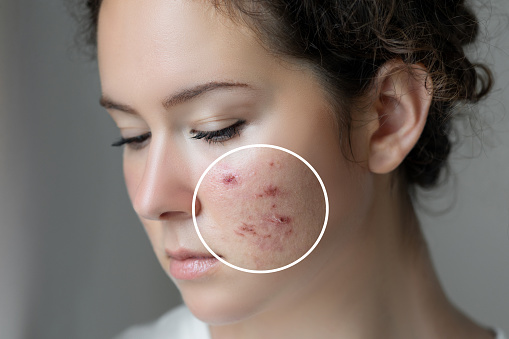What is Acne ?
Acne is a common skin condition that occurs when hair follicles become clogged with oil, dead skin cells, and bacteria. This can lead to the formation of pimples, blackheads, whiteheads, and cysts on the face, neck, chest, back, and shoulders.
The exact causes of acne are not fully understood, but it is known to be related to hormonal changes during puberty, pregnancy, and menstruation. Other factors that can contribute to acne include genetics, stress, certain medications, and some skincare and cosmetic products.
Acne can be mild, moderate, or severe, and it can cause emotional distress and self-esteem issues, especially when it appears on the face. Treatment for acne may include topical or oral medications, lifestyle changes, and skincare practices, depending on the severity and underlying causes of the condition.
How Acnes is formed
Acne is formed when hair follicles become clogged with oil, dead skin cells, and bacteria. Here's how it happens:
The sebaceous glands in the skin produce an oily substance called sebum, which helps keep the skin lubricated and protected.
Sometimes, the sebaceous glands can produce too much sebum, which can combine with dead skin cells and block the hair follicles, creating a plug or comedo.
When the plug is open to the skin's surface, it appears as a blackhead, which is a small, dark spot on the skin.
When the plug is closed and trapped beneath the skin's surface, it appears as a whitehead, which is a small, white or flesh-colored bump on the skin.
Bacteria can then grow inside the plugged follicle, leading to inflammation and the formation of a red, painful pimple.
In severe cases, the inflammation can lead to the formation of nodules or cysts, which are large, deep, and painful lumps that can cause scarring.
The formation of acne is influenced by several factors, including genetics, hormonal changes, stress, and certain medications. Proper skincare practices and treatment can help manage acne and prevent scarring.
Acne problem solutions
Acne is a common skin problem that affects people of all genders, ages, and skin types. Here are some solutions specifically for men who are struggling with acne:
Keep your skin clean: Men tend to have oilier skin than women due to higher levels of androgens, which can contribute to acne. Therefore, it's essential to wash your face twice daily with a gentle cleanser to remove excess oil, dirt, and sweat.
We recommend this Garnier Men Acno Fight face wash for mens
click on the image to view product
Shave carefully: Shaving can irritate the skin, leading to acne breakouts. Therefore, use a sharp razor and shaving cream to avoid razor burns and ingrown hairs. If possible, shave after a warm shower when the skin is soft.
Avoid touching your face: Your hands carry bacteria and dirt, and touching your face can transfer these to your skin, causing breakouts. Therefore, try to avoid touching your face and keep your hands clean. Always carry a pocket hand sanitizer with you. View product given below.
Moisturize your skin: Moisturizing your skin can help prevent dryness and flakiness, which can contribute to acne breakouts. Choose a non-comedogenic moisturizer that won't clog your pores.
Use acne-fighting products: You can use over-the-counter acne-fighting products that contain salicylic acid, benzoyl peroxide, or retinoids. These ingredients can help unclog pores, reduce inflammation, and kill acne-causing bacteria.
Watch your diet: Certain foods, such as dairy products, high glycemic index foods, and foods high in iodine, can trigger acne breakouts. Therefore, try to limit your intake of these foods and eat a balanced diet rich in fruits, vegetables, and whole grains.
Manage stress: Stress can trigger acne breakouts by increasing cortisol levels, a hormone that can stimulate oil production. Therefore, practice stress-management techniques such as exercise, meditation, or deep breathing.
If your acne is severe or persistent, it's essential to see a dermatologist who can prescribe stronger medications or recommend other treatments.









0 Comments
Don't spam and spam links, please don't use abusing words
Emoji